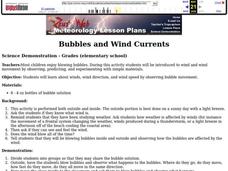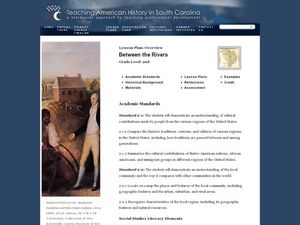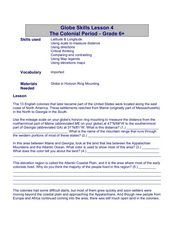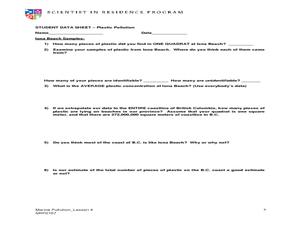Curated OER
Along Our Coast
Students explore the coast lines of Florida. They examine the benefits of estuaries and examine the estuary systems found along the coast. Students research and construct a saltwater food web.
Curated OER
Primary Producers
Students examine the role of carbon in the oceans and how phytoplankton determine the levels present. In groups, they practice measuring primary productivity using two methods. They use the internet to research the role of phytoplankton...
Curated OER
North Carolina Textured Landscape
Fourth graders explore the artistic ideas of landscape, foreground, middle ground, and background through a creative painting project. While this is written for North Carolina, teacher may adapt for any state/region.
Curated OER
Pollution Solution
Students explore the topic of oil pollution and how it affects the global ocean. They discuss oil spills in recent history and use problem solving skills to decide what strategies could be used to actually clean up an oil spill. Students...
Curated OER
The Dead Zone: A Marine Horror Story
Students graph dissolved oxygen versus depth using data taken from NECOP Program. In this marine science lesson, students explain the causes of hypoxia. They recommend possible solutions to this problem.
Curated OER
Bermuda: Search for Deep Water Caves 2009: Out of Darkness
Students analyze the three models on the origin of troglobitic fauna. In this life science lesson, students also consider how the Zonation model explains the fauna's origin. They also use the Internet to research solutional and volcanic...
Curated OER
Bubbles and Wind Currents
Students are introduced to wind and wind movement by observing, predicting, and experimenting with simple materials.
Curated OER
the Potential Consequences of Climate Variability And Change
Students analyze the consequences of changing variables on a system. Changes in a model are measured and recorded and conclusions drawn based on the data provided in this six lessons unit.
Curated OER
The ABC's of Walter Anderson
Fifth graders examine how motifs, symbols, and ideas influence various pieces of visual art. They compare and contrast the work of Walter Anderson to pre-historic cave paintings and create a glue line print using motifs and symbols found...
Curated OER
The Fish Trade
High schoolers read and discuss a document regarding how the global fish trade is important to humans all over the world. Students conduct Internet research and write a scenario about what would happen if other countries did not help...
Curated OER
Losing An Island
Students examine carbon dioxide and determine the impact of greenhouse gases on the earths spheres. In this pollution lesson students complete a lab activity to see the impact of gases on the environment,
Curated OER
What I Can Do on Summer Vacation
Students explore environmentally friendly activities for summer vacation on the Gulf and create a travel guide for these activities.
Curated OER
Between the Rivers
Second graders compare and contrast historical American cultures. In this American history lesson, 2nd graders participate in reading, writing, oral, and hands on activities. Students discuss the similarities and differences...
Curated OER
Globe Skills Lesson 4 The Colonial Period
Learners practice their map skills. In this Colonial geography instructional activity, students complete an activity that requires them to locate English colonial locations using latitude and longitude coordinates.
Curated OER
Geographic Regions of Arkansas
Students examine maps that illustrate the various regions in Arkansas. They label the individual regions on a blank map that is divided into the regions and color each region a different color. Groups research a region and create a...
Curated OER
Exploring Deep Ocean Habitats: Alien Invasion
Students compare and contrast "alien species" and "invasive species."Students explain positive and negative impacts associated with introduction of non-native species, and give a specific example of species that produce t
Curated OER
Life on the Edge: Exploring Deep Ocean Habitats Cool Corals
Students research the basic morphology of Lophelia corals and polyps to determine the significance of these organisms. They detail the reasons that biological communities are focusing on the Lophelia corals as major conservation efforts.
Curated OER
What Was for Dinner?
Students examine energy obtaining strategies that are used by organisms in deep reef communities. In this ocean lesson students complete an isotope activity.
Curated OER
Estuary Issues
Fifth graders read a description of an estuary and search for problems that occur there. In this estuary lesson, 5th graders mediate controversial issues for the best solutions.
Curated OER
You Are What You Eat: Plastics and Marine Life
Students study the different types of plastics and see which ones sink or remain buoyant. In this ocean environmental lesson plan students complete several handouts, and view a film on PBS.
Curated OER
So, What's it Doing Today?
Students describe short-term variations in oceanographic parameters in the Gulf Stream. In this ocean habitats lesson students use satellite imagery to obtain information in the Gulf Stream.
Curated OER
Defining Regions
Fifth graders will work in cooperative learning groups to research North American regions and create presentations to share with their classmates. To show what they have learned, 5th graders will create maps of North American regions.
Curated OER
Plastic Pollution
Young scholars determine with math concepts how much plastic pollution is affecting marine life. In this plastic pollution lesson plan, students collect scientific data from a field trip to a water treatment plant.
Curated OER
WONDERFUL, WATERFUL WETLANDS
Students list characteristics of wetland and describe the functions of a wetland.























